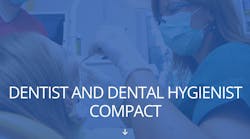Counterpoint: DDH Compact and license reciprocity
Editor's note: Since the publication of this letter to the editor, representatives from the American Dental Hygienist Association, the American Dental Association, and the Council of State Governments have submitted their own rebuttal.
RDH encourages readers to familiarize themselves with both compacts and their respective websites:
As an avid reader of RDH magazine for many years, I appreciate information that keeps me informed, in touch with my fellow hygienists, and aware of current events. After reading the article dated January 9, 2024, titled “DDH Compact: Working toward dentist and dental hygienist license reciprocity across state lines,” I felt compelled to reach out.
For the record, I have been a dental hygienist for more than 30 years, and I currently serve as president of the Montana Board of Dentistry and I’m the dental hygiene board member of the American Association of Dental Boards (AADB). For the past 15 years, I’ve participated in the administration of dental licensure examinations for both the Western Regional Examining Board (WREB) and now CDCA-WREB-CITA, administering ADEX examinations to graduates and mobile professionals from across the United States.
I agree that portability is important and can be addressed with the institution of a well-designed licensure compact. Throughout my career, I’ve held licenses in four states, navigating the challenges of obtaining licensure each time. Yet, the compact you feature puts our profession in jeopardy.
This is an exciting time for dentists, dental hygienists, veterans, and military spouses in the dental field as licensure compacts can streamline the pathway to practice. But we must not sacrifice public protection to pursue our own agendas. The Council of State Government’s (CSG) Compact fails to create a licensure standard enabling participating jurisdictions to confidently license qualified individuals. It lacks a hand skill requirement, does not require a Commission on Dental Accreditation (CODA)-accredited program as an educational foundation (by leaving the door open for now-undefined accreditors), and could permit those with discipline problems and criminal convictions to practice where otherwise disallowed.
These concerns are addressed by the American Association of Dental Boards (AADB) Dental and Dental Hygiene Licensure Compact.
Unlike the CSG, the AADB compact uses the model of the successful medical compact to create standardized benchmarks for the portable licensure of dentists and dental hygienists. The tenets of the AADB Dental and Dental Hygiene Licensure Compact are simple:
- Graduate from a CODA approved school,
- Pass the National Boards,
- Pass the licensure exam administered by the American Board of Dental Examiners (ADEX), or be in practice five years having passed a regional licensing exam testing dental hygiene hand skills (including calculus detection, calculus removal and periodontal probing),
- Hold a full and unrestricted license in the state where you live,
- Have no criminal, board-related, DEA-related, or other convictions, negative actions, or active investigations in progress.
AADB Compact privilege holders will have met a gold standard of qualifications to practice, ensuring public protection to the greatest extent possible. The AADB Compact allows state dental boards to issue actionable licenses to compact privilege holders.
I want to stress what the AADB Compact does not do. The AADB Compact does not:
- Lower the standards to practice in any jurisdiction by allowing less stringent discipline thresholds,
- Compromise patient safety with the elimination of a hand skills examination requirement,
- Hedge bets on the future of educational accrediting with an open-door education requirement,
- Limit practice to those completing ADEX examinations. Existing practitioners who have completed any regional board before enactment can participate in the compact.
The AADB and CSG Dental and Dental Hygiene Licensure Compacts are dramatically different.
Before my personal affiliations give pause to publishing, let us note that the credited author of the January 9 article is an employee of the Council of State Governments. I hope you choose to publish this message and allow your readers to educate themselves on the landscape of licensure as it exists today.
Sincerely,
Diane Klemann, BA, RDH, LAP
President of the Montana Board of Dentistry








